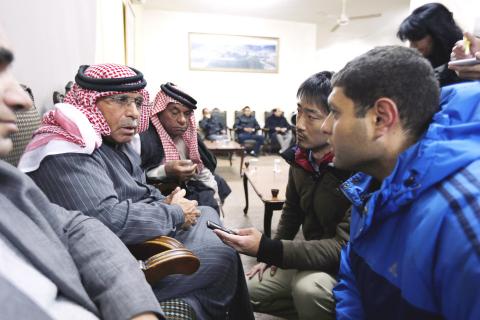Efforts by Japan and Jordan to secure the release of two of their nationals held captive by Islamic State militants remain “deadlocked” and the situation remains highly unpredictable, Japanese officials said on Friday.
Militants earlier threatened to kill Jordanian pilot Muath al-Kasaesbeh unless a would-be suicide bomber on death row in Amman was handed over by sunset on Thursday.
Japanese journalist Kenji Goto was also being held by the militants.

Photo: Reuters
“The situation is deadlocked,” Japanese State Minister for Foreign Affairs Yasuhide Nakayama said in Jordan late on Friday, according to Japanese public broadcaster NHK.
Japanese Minister for Foreign Affairs Fumio Kishida yesterday said in Tokyo that the situation was unpredictable, NHK reported.
“Anything could happen,” he said. “We cannot predict it at all. While preparing for every situation, I want to make every effort for Mr Goto’s release.”
Japanese Chief Cabinet Secretary Yoshihide Suga arrived at Japanese Prime Minister Shinzo Abe’s office yesterday afternoon, and the prime minister remains on standby to receive regular updates on the situation, NHK said.
Jordan’s army on Friday said that state agencies were “working round the clock.”
An audio message purportedly from Goto said the pilot would be killed if Jordan did not free Sajida al-Rishawi, jailed for her role in a 2005 suicide bomb attack that killed 60 people in Amman.
The crisis comes as the group, which has already released videos showing the beheadings of five Western hostages, is coming under increased military pressure from US-led air strikes and by Kurdish and Iraqi troops pushing to reverse the Muslim extremist group’s territorial gains in Iraq and Syria.

AGING: As of last month, people aged 65 or older accounted for 20.06 percent of the total population and the number of couples who got married fell by 18,685 from 2024 Taiwan has surpassed South Korea as the country least willing to have children, with an annual crude birthrate of 4.62 per 1,000 people, Ministry of the Interior data showed yesterday. The nation was previously ranked the second-lowest country in terms of total fertility rate, or the average number of children a woman has in her lifetime. However, South Korea’s fertility rate began to recover from 2023, with total fertility rate rising from 0.72 and estimated to reach 0.82 to 0.85 by last year, and the crude birthrate projected at 6.7 per 1,000 people. Japan’s crude birthrate was projected to fall below six,

Conflict with Taiwan could leave China with “massive economic disruption, catastrophic military losses, significant social unrest, and devastating sanctions,” a US think tank said in a report released on Monday. The German Marshall Fund released a report titled If China Attacks Taiwan: The Consequences for China of “Minor Conflict” and “Major War” Scenarios. The report details the “massive” economic, military, social and international costs to China in the event of a minor conflict or major war with Taiwan, estimating that the Chinese People’s Liberation Army (PLA) could sustain losses of more than half of its active-duty ground forces, including 100,000 troops. Understanding Chinese

SELF-DEFENSE: Tokyo has accelerated its spending goal and its defense minister said the nation needs to discuss whether it should develop nuclear-powered submarines China is ramping up objections to what it sees as Japan’s desire to acquire nuclear weapons, despite Tokyo’s longstanding renunciation of such arms, deepening another fissure in the two neighbors’ increasingly tense ties. In what appears to be a concerted effort, China’s foreign and defense ministries issued statements on Thursday condemning alleged remilitarism efforts by Tokyo. The remarks came as two of the country’s top think tanks jointly issued a 29-page report framing actions by “right-wing forces” in Japan as posing a “serious threat” to world peace. While that report did not define “right-wing forces,” the Chinese Ministry of Foreign Affairs was

US President Donald Trump in an interview with the New York Times published on Thursday said that “it’s up to” Chinese President Xi Jinping (習近平) what China does on Taiwan, but that he would be “very unhappy” with a change in the “status quo.” “He [Xi] considers it to be a part of China, and that’s up to him what he’s going to be doing, but I’ve expressed to him that I would be very unhappy if he did that, and I don’t think he’ll do that. I hope he doesn’t do that,” Trump said. Trump made the comments in the context